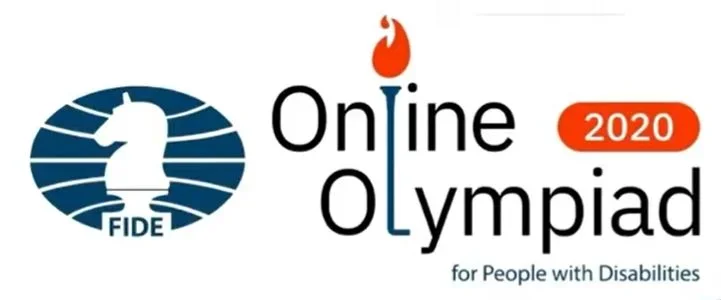
While American families were enjoying Thanksgiving yesterday, four talented chess players on Team USA were duking it out with Argentina in round six of the first ever online FIDE Chess Olympiad for People with Disabilities, organized by the International Chess Federation (FIDE). They won the round, and today achieved their dream — to finish within the top ten teams in the world. Final rankings can be found here.
The Olympiad, which began on November 21, brings together 400 players from 45 countries, in 61 teams. The Swiss stage ended on November 27; the semifinals and finals continue through December 2 with a closing ceremony on December 3. The players of Team USA hail from across the country and range in age from nine to 46 years old. The disabilities they contend with include quadrilateral phocomelia (four short limbs), epilepsy, autism, blindness, and muscular spinal atrophy.
Ranked 39th going into the tournament, Team USA defeated Brazil on November 27, winning the seventh round and tying for 10th in the Olympiad. Their goal had been to make it to the top ten.
The story of Team USA this year is a story of reaching for seemingly impossible dreams. Coached by National Master Lior Lapid, who runs PALS Chess Academy in Denver, Colorado, the team defied the odds from the start, winning all of their games in the practice round.
“Each of the amazing players on Team USA is a champion, a role model for everyone overcoming challenges and following their dreams against the odds, especially during these difficult times when so many people are struggling with the pandemic,” said coach Lapid. “They played brilliantly, far exceeding all expectations of our team going into this Olympiad.”
Playing higher rated teams in every round of the Olympiad, including three top-10 teams, Team USA began the tournament with a draw against Russia 2 (ranked 9th), followed by a loss to Philippines 1 (ranked 3rd). They rebounded strongly, defeating Romania 2 in the third round, and scoring a resounding 3.5-0.5 victory over North Macedonia (ranked 10th) in the fourth round. After losing to Chile in round five, Team USA came back in round six with an impressive 3-1 victory over Argentina and finished strong with a 3-1 victory over Brazil in the seventh and final round.
They achieved this success in spite of the fact that their second board player, Griffin McDonnell, 16, was having up to four seizures a day, sometimes during games. Even while facing this enormous physical and mental challenge, Griffin delivered wins in four critical rounds for Team USA.
“The resilience of the players, their refusal to give up and their determination to rebound from losses and from seemingly lost positions is incredible,” Lapid said. “We hope that our team’s success will inspire people of all backgrounds to explore and pursue the beautiful game of chess.”
As part of an effort to share their story, Team USA is collaborating on a documentary about their journey through the Olympiad, made by filmmakers Manuela Marcovici and Ilana Lapid. Because of the Coronavirus pandemic, the filmmakers are filming the documentary over Zoom, enlisting the help of the players and families to document their lives during the tournament.
“There were many firsts involved in this experience,” said Lapid. “This was the first Olympiad of its kind, and because of COVID-19 it was played online, which was also a first. We hope to have the opportunity to compete in person next year at the next Olympiad for People with Disabilities in Khanty-Mansiysk, Russia.”

On Board 1 for Team USA was Michael Aigner, 46, a National Master. Hailing from northern California, Aigner was born with quadrilateral phocomelia. Aigner drives a powered wheelchair while actively participating in the top division at chess tournaments. A second place finish at the 2006 US Open in Chicago earned him an invitation to the 2007 US Championship in Oklahoma. Aigner, who holds a master’s degree in Mechanical Engineering from Stanford, has two decades of experience coaching private students, over a dozen of whom have progressed to Master level themselves. His work as a chess player and coach has been featured in the New York Times.
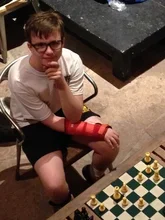
Griffin McConnell, 16, playing Board 2, hails from Golden, CO. Diagnosed with epilepsy at age 5, he had his first brain surgery at 7, and a functional left hemispherectomy brain surgery at age 8. He had to relearn how to walk, talk and live with permanent disabilities. McConnell deals with daily chronic cluster headaches, migraines, speech disorders, right sided blindness, and epilepsy. None of this has prevented him from being successful in chess. McConnell is a former Colorado State Scholastic Chess Champion and was invited to compete in the First Confederation Cup for People with Disabilities in 2019. Traveling to Ankara, Turkey, to represent the Americas, he was recognized with the award of Best Player of the tournament. McConnell also loves performing and starred in a production of Chicago in 2019, produced by Phamaly Theatre Company.
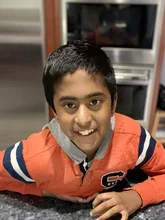
On Board 3 of Team USA was Pranav Shankar, a 13-year-old avid chess player from New Jersey. Born in India and diagnosed with Autism Spectrum Disorder as a young child, Shankar’s passions are math, chess, and piano. He qualified for the High School Math League National Championship in May 2020 and has performed piano recitals at the Merkin Hall, Baruch Hall and Columbia University in New York City. He was a National Winner at the National Guild Piano Auditions in 2020. Shankar’s most successful chess tournament was the NJ Open in 2018 where he won top U2000 rated player, in the Open section. Shankar also likes to learn different languages. In his free time, he loves scrolling through Wikipedia to learn new things and play "Among Us" with his sister.
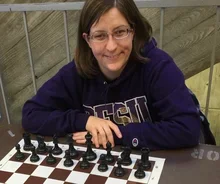
On Board 4 was Jessica Lauser, 40, hailing from Northern California, though currently residing in Western Missouri, where she works as a federal employee. An avid participant of tournament chess, Lauser is the 3-time, reigning U.S. Blind Champion, the only woman to have earned this distinction. Lauser has played over 250 rated tournaments throughout the country, and has qualified to represent the U.S. in numerous international events, including team-based World Blind Olympiads and individual IBCA (International Braille Chess Association) World Championships. Legally-blind since birth, Lauser has found, in chess, a means to attain equality and success, even while contending with lifelong vision-loss. Lauser’s goal is to become the first woman in the U.S., having always experienced blindness, to attain the rating of National Master, hopefully inspiring others along the way. Holding dual degrees in History and Russian, Lauser hopes to pursue advanced education and a career in the language.
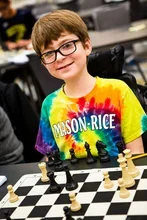
On Board 5 was first alternate for Team USA, Oskar Zoffer, a 6th grader from Newton, Massachusetts. Having learned chess from his father at age 8, Zoffer, now 11, has won many trophies in Massachusetts tournaments, including a gold medal with his team at the 2019 Massachusetts Winter Team Challenge. Diagnosed with Spinal Muscular Atrophy type 2, Zoffer doesn’t let his disability stop him, and dreams of becoming a chess grandmaster, an astrophysicist, and a musician. Following in the footsteps of his parents, both professional musicians, Zoffer’s love of singing classical, jazz, and pop tunes, has delighted many an audience. Zoffer has studied voice and played electric drums and melodica in jazz ensembles at the New England Conservatory of Music Preparatory School for the past three years. During the 2020 pandemic, Zoffer made one of his dreams come true by creating his own YouTube channel, "Chess and Music with Oskie Z."
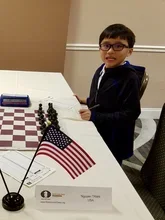
On Board 6 was Nguyen Tran, hailing from Lake Charles, Louisiana. At nine years old, he was the youngest player in the world to qualify for the Olympiad. Tran has a physical disability with a semi-paralyzed left leg, and he exercises on a special bicycle each day to strengthen his legs. He and his twin brother started playing chess at age 5 and spend an hour or two every day practicing chess. Tran loves math, science and building lego structures. He is also a blue belt in karate. His current favorite book series is The Diary of a Wimpy Kid. He loves homemade waffles for breakfast.
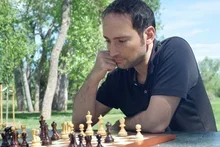
National Master Lior Lapid served as captain and coach of Team USA. A four-time Colorado State Champion and two-time National Champion in the K-9 and K-12 divisions, Lapid founded and has run PALS Chess Academy in Denver since 2012. He has appeared in Chess Life and several other publications, most recently being featured as one of the “15 Under 40” in the Intermountain Jewish News. Lapid has coached dozens of former or reigning scholastic state champions in New Mexico and Colorado, as well as former National Blitz Champions in the K-6 Team Division. In 2019, Lior was appointed captain of Team Americas at the 1st FIDE Confederation Cup for People with Disabilities, where his student Griffin McConnell won top honors for the best game and best overall result in the tournament. A passionate teacher with an extensive theater background, Lapid incorporates humor and inspirational storytelling into his roles as captain and coach of teams/players of all ages.
Team members and family contributed to this article.
Categories
Archives
- January 2026 (8)
- December 2025 (27)
- November 2025 (29)
- October 2025 (39)
- September 2025 (27)
- August 2025 (29)
- July 2025 (43)
- June 2025 (25)
- May 2025 (24)
- April 2025 (29)
- March 2025 (29)
- February 2025 (20)
- January 2025 (24)
- December 2024 (34)
- November 2024 (18)
- October 2024 (35)
- September 2024 (23)
- August 2024 (27)
- July 2024 (44)
- June 2024 (27)
- May 2024 (31)
- April 2024 (51)
- March 2024 (34)
- February 2024 (25)
- January 2024 (26)
- December 2023 (29)
- November 2023 (26)
- October 2023 (37)
- September 2023 (27)
- August 2023 (37)
- July 2023 (47)
- June 2023 (33)
- May 2023 (37)
- April 2023 (45)
- March 2023 (37)
- February 2023 (28)
- January 2023 (31)
- December 2022 (23)
- November 2022 (32)
- October 2022 (31)
- September 2022 (19)
- August 2022 (39)
- July 2022 (32)
- June 2022 (35)
- May 2022 (21)
- April 2022 (31)
- March 2022 (33)
- February 2022 (21)
- January 2022 (27)
- December 2021 (36)
- November 2021 (34)
- October 2021 (25)
- September 2021 (25)
- August 2021 (41)
- July 2021 (36)
- June 2021 (29)
- May 2021 (29)
- April 2021 (31)
- March 2021 (33)
- February 2021 (28)
- January 2021 (29)
- December 2020 (38)
- November 2020 (40)
- October 2020 (41)
- September 2020 (35)
- August 2020 (38)
- July 2020 (36)
- June 2020 (46)
- May 2020 (42)
- April 2020 (37)
- March 2020 (60)
- February 2020 (38)
- January 2020 (45)
- December 2019 (34)
- November 2019 (35)
- October 2019 (42)
- September 2019 (45)
- August 2019 (56)
- July 2019 (44)
- June 2019 (35)
- May 2019 (40)
- April 2019 (48)
- March 2019 (61)
- February 2019 (39)
- January 2019 (30)
- December 2018 (29)
- November 2018 (51)
- October 2018 (45)
- September 2018 (29)
- August 2018 (49)
- July 2018 (35)
- June 2018 (31)
- May 2018 (39)
- April 2018 (31)
- March 2018 (26)
- February 2018 (33)
- January 2018 (30)
- December 2017 (26)
- November 2017 (24)
- October 2017 (30)
- September 2017 (30)
- August 2017 (31)
- July 2017 (28)
- June 2017 (32)
- May 2017 (26)
- April 2017 (37)
- March 2017 (28)
- February 2017 (30)
- January 2017 (27)
- December 2016 (29)
- November 2016 (24)
- October 2016 (32)
- September 2016 (31)
- August 2016 (27)
- July 2016 (24)
- June 2016 (26)
- May 2016 (19)
- April 2016 (30)
- March 2016 (36)
- February 2016 (28)
- January 2016 (32)
- December 2015 (26)
- November 2015 (23)
- October 2015 (16)
- September 2015 (28)
- August 2015 (28)
- July 2015 (6)
- June 2015 (1)
- May 2015 (2)
- April 2015 (1)
- February 2015 (3)
- January 2015 (1)
- December 2014 (1)
- July 2010 (1)
- October 1991 (1)
- August 1989 (1)
- January 1988 (1)
- December 1983 (1)







